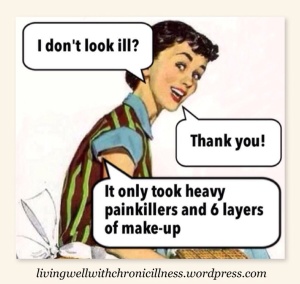Wondering who else was brought up this way? These words were often spoken to me when I was a chronically ill kid. I was also told that if someone asked me ‘how are you?’ that I should lie and say ‘I’m fine’, any other answer was considered ‘rude’. I still have no idea why that was considered rude if you say that you’re not ok, or that you’re in pain, depressed etc. Sadly society expect people to put up happy fakery, that hasn’t changed much since I was little.
But I also wonder if there was something else to it, maybe that it would reflect on my parents if I gave an honest answer, maybe they thought it mean I wasn’t brought up well, that people would think me a rude kid? Or were they thinking what people would wonder about me, about why I was not well? I have no idea if my parents ever talked with friends about the fact their child was ill, but I doubt it. After all, doctors couldn’t find out what was wrong with me, so my own parents thought it was in my head and that I was just a rebellious teenager.
I suspect this has happened and still happens to kids who are ill, where the doctors fail to diagnose them. It is quite common to be misdiagnosed, especially with illnesses like dysautonomia/POTS and Ehler-Danlos Syndrome. But I am sure it happens with other illnesses too.
How does that affect people when they are adults? I can not speak for other people of course, but I am still affected by it year and years later. Whenever I go to a doctor I expect them to give me a blank stare and say they don’t know what’s wrong with me, or that it is in my head. I expect to not be taken seriously at all. Even though in the meantime I have met plenty of good doctors. Problem is that this issue with doctors wasn’t only in my childhood, but most of my adulthood as well, it’s something that still is very hard to come to terms with and has sort of created an expectation of how doctors will treat me.
I’d love to hear stories of other people and how this affected them. Or maybe it doesn’t bother you anymore? Tell me 🙂
Don’t talk about it, don’t tell anyone and pretend to be ok





You must be logged in to post a comment.